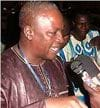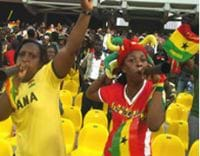John Mahama Clashes With Mills: Website
...Ghana won’t turn into Kenya, he insists The groundswell begun with a repudiation by the party's leader in Parliament, six days after John Evans Atta Mills, flagbearer of the National Democratic Congress, had all but declared that Ghana would witness scenes akin to what is currently pertaining in Kenya if the NDC loses this December's general elections. Two weeks later, the man widely tipped to be his running mate has dismissed Prof Mills’ claim that Ghana could turn into a Kenya after the elections. Contributing yesterday at a round table discussion organised by the Ghana Centre for Democratic Development, John Mahama, MP for Bole-Bamboi, declared, "I don’t believe Ghana can degenerate into the Kenyan situation.”The theme for the discussion was, "Towards a Peaceful Election 2008; The National Security Environment."The Bole-Bamboi MP stated that he does not believe that the country’s December polls could degenerate into the Kenyan situation because the two nations have different electoral systems. Mr Mahama noted that he had had the opportunity to be part of monitoring missions to observe elections in some countries in Africa, and comparatively Ghana’s electoral system has developed and improved over the years. He mentioned transparent ballot boxes, counting of the ballot papers at the polling stations, the use of photo identity cards by voters as some good measures put in place by Ghana’s Electoral Commission to checkmate rigging. These preventive measures are not available in most African countries including Kenya, he added. It would be recalled that Prof Mills, on January 9, 2008, warned the nation to expect mayhem if the party suspects the results of the December polls were rigged in favour of the NPP. But less than a week later, Alban S K Bagbin, Minority Leader, dismissed his leader’s warning, maintaining that the country’s democracy had been too deeply entrenched for such scare mongering to have any effect. Continuing, Mr Mahama, however, expressed concern about what he called 'worrying signals’ arising out of the 2004 general election, where results in five constituencies were later on overturned by the court. K B Quantson, a security expert, who was the main speaker, stated that the current political atmosphere is contaminated and decried the situation whereby politicians across the political divide have termed this year’s general election as ‘mother of all elections’, and are engaged in aggressive, provocative rhetoric amid accusations of violence by political parties against opponents. He pointed out that elections should be seen as a fair means of changing governments. "In an acrimonious, divisive, volatile political environment, the possibility that fanatical or unthinking people can be manipulated to embark on criminalities for parochial political ends should receive sustained attention." He again criticized the heavy security personnel at the congresses of political parties and said it does not auger well for democracy.Mr Quantson challenged academia to research into the problems on how government institutions such as the judiciary, Parliament, the presidency, ministries, the civil service, the police service, government parastatals etc over the past fifteen years have not lived up to expectations, to guide the next government. According to the security expert, the future of the country’s democracy should reside in a vigorous, patriotic and enlightened civil society groups which can mobilise the nation to police national institutions and structures established to protect the national interest. Touching on national security, Mr Quatson identified crime as the major national security threat and urged the security agents to give it the attention it deserves. He also mentioned that drug trafficking should be seen as a national calamity and suggested that it is important that politicians declare their stand on how to fight the drug war in the county because "the problem needs political will." According to him, anybody or anything which undermines the national interest should be regarded as a national security threat and the national security apparatus should be able to identify and protect the national interest. The retired security expert cited conflicts in Bawku, Yendi, Tamale, Anloga, and Sefwi as some of flash points which could be exploited settle scores in this election year. Gyimah-Boadi of CDD stated that the 2008 general election provides another opportunity to test whether the nation can maintain or even improve on its record of organising peaceful and credible elections. According to him, the test include a reasonably even electoral playing field, neutral and effective election administration, effective voter education, electoral transparency, political party, media and civil society vigilance. Kwesi Aning, Head of the Conflict Prevention, Management and Resolution Department at the Kofi Annan International Peacekeeping Training Centre chaired the discussion.
Source: PFM








